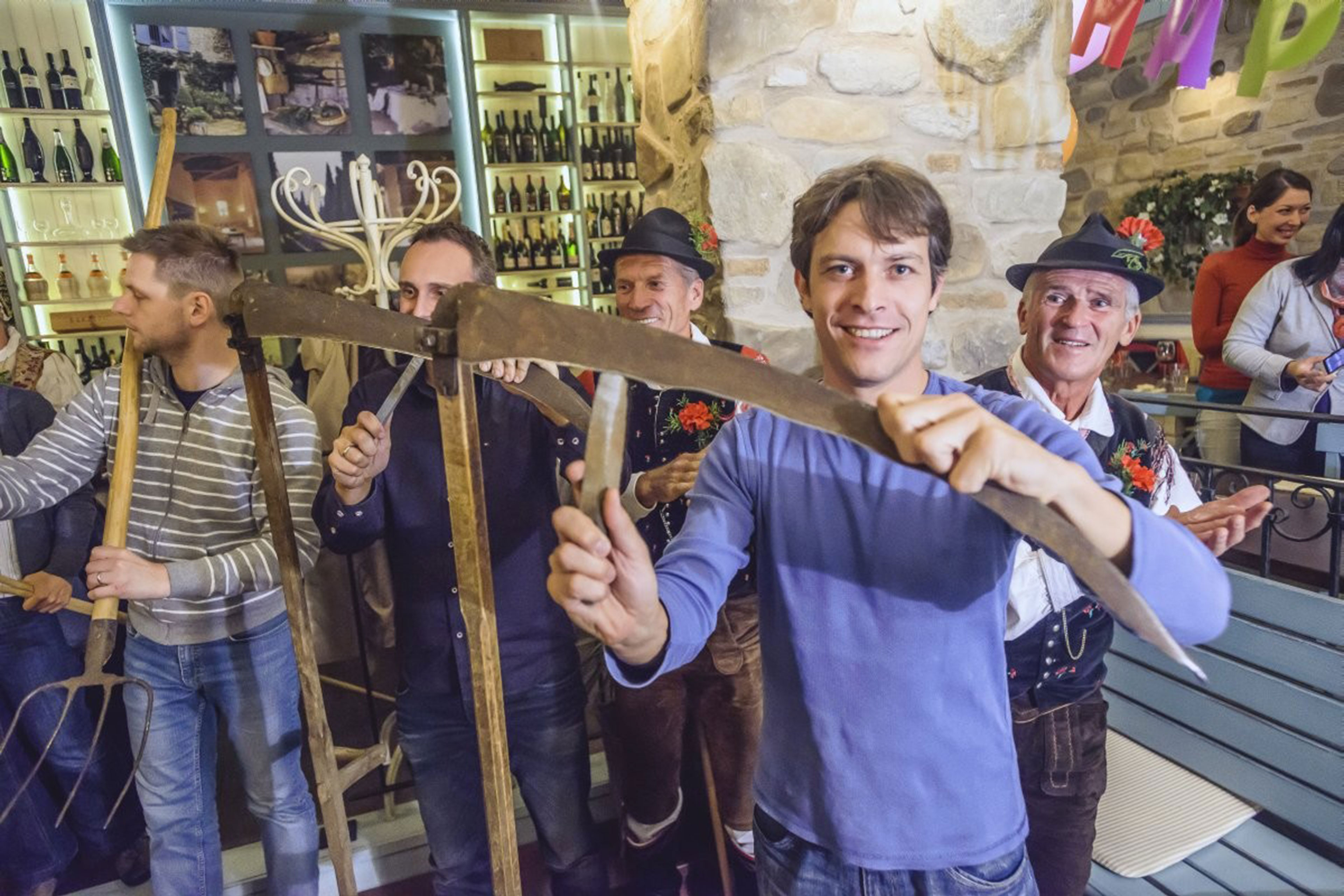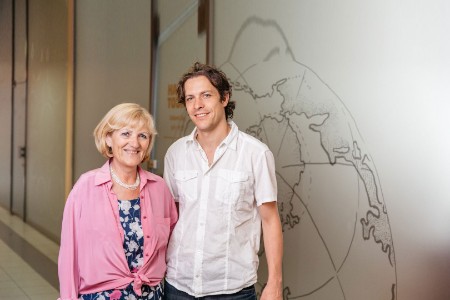From children’s magazine to tourism
The Happy Tours story began at the turn of the millennium, when Sašo Krumpak and his father Ivan set up a small publishing company. They began publishing a children’s magazine called “Hepko”, or “Happy” in its English version. The son’s ingenuity was boosted by the business experience of his father, who helped him with advice from the outset, while his mother took care of the accounting. “The 70-page Slovenian language version of the magazine was published monthly, while the English language version was published every second month. We were selling it in all Slovenian elementary schools with a circulation of around 3,000 copies. Unfortunately, after six years, this gradually declined, until I made the decision to stop publishing it,” recalls Sašo.
Determined to continue building on his entrepreneurial spirit, he focused on what was at the time their parallel activity - the organization of trips abroad. “Alongside the publication of the magazine, we also organized trips for schoolchildren to the Gardaland amusement park, plusexcursions for teachers’ trade unions and others. Thus, with the end of the publishing activity, the tourism business developed. Shortly thereafter, we began to organize trips for businesses and our largest customer was NLB,” 1 Public Agency for Entrepreneurship, Internationalization, Foreign Investments and Technology explains Sašo. The initial knowledge and contacts were gained through active visits to tourist fairs, as well as other events and seminars, both at home and around Europe. “We travelled to England, Berlin, Madrid, and always attended all the events organized by SPIRIT1,” explains the founder of the company.

Slovenia and Croatia are increasingly popular destinations
The period of global economic crisis in 2008 had a major impact on tourism. Fortunately, Happy Tours recognized the opportunity for incoming tourism, which now accounts for 99% of their activity: “In 2008, I went to London’s second largest tourist fair, where countries are promoted and where you have the opportunity to make contacts with foreigners who wish to visit Slovenia. This seemed like a very interesting option to me and we gradually started abandoning the organization of trips to foreign countries. It was a decision which was also influenced by difficult economic conditions in Slovenia.”
Happy Tours succeeded in turning the most recent global economic crisis to their own benefit, although the dependence of tourism on the world’s geopolitical situation remains strong. “Our business is impacted, for example, by the crisis in Asia, currency changes and the political situation in Europe.” The political situation also affects the choice of destinations; while some European metropolises have fewer visitors, visits to Slovenia and Croatia are on the rise. The record 30% growth in 2017 confirms that this will be another successful year.
Tourism enriches personality
In addition to his parents, Sašo’s wife, a co-owner of the English company, has also joined the business. “Mum continues to be responsible for accounting, while dad works as an external consultant. Being a family business helps tremendously, because we have no issues with trust and dedication. Of course, as a result, our private lives are very much intertwined with the work,” says Sašo. His mother Jadranka confirms that the family business never rests: “We are always ready to work, any time of day, regardless of whether it is a weekend or a holiday. If something needs to be done, it gets done.”
The Krumpak family believes that tourism helps people learn about different cultures and customs. “Tourism enriches us; it is one of the better-quality activities, so I want to be associated with it. I want to do the things that interest me, make me happy, those which I believe have a positive impact on the environment. I am not committed solely to Slovenian society, because I believe that we are all equal,” says Sašo, revealing his philosophy. Eight-year-old Ulani, Sašo’s daughter, is already becoming involved in the family business, as this is their way of life: “She is eager to help and she already knows what a voucher is. I’m happy and proud that she is growing up with tourism. She makes no distinction between a person’s skin color; the only thing that matters to her is how good they are,” proudly explains her father.
“The 70-page Slovenian language version of the magazine was published monthly, while the English language version was published every second month. We were selling it in all Slovenian elementary schools with a circulation of around 3,000 copies. Unfortunately, after six years, this gradually declined, until I made the decision to stop publishing it,” recalls Sašo.
An external manager to promote stronger growth
The Company’s headquarters is in Domžale. The team of approximately 50 employees is led by director Viljam Kvalič, who has no family relationship with the Krumpaks. “Some time ago, I realized that while I was a good manager, the company had reached a certain level of development, where I had to come up with a new solution to assure and encourage continuous growth. I am known for my horizontal management structure which, if we wanted to grow further, was no longer the best solution. So, I hired an external manager. This resulted in the need to change some working models, which was not easy and quite painful for some, especially colleagues with previous experience,” reflects Sašo on the changes and the new manager Viljam, who had 15 years of experience working in a comparable position in tourism.
Two years ago, they opened a company in London; it has five employees and is managed by Sašo. In addition, they also have offices in Dubrovnik and Pula, where they mainly take care of the operational part of the business and cover Dalmatia and part of Bosnia. “We also have three offices in Asia - Shanghai, Malaysia, and one in Bangkok, where we also have a Slovenian manager present,” adds Sašo. Asia is their most profitable market, as 80% of their guests come from this area.
Diversity as the source of competitive advantage
Employees from all over the world meet once a year at a joint event where they can have fun and enjoy each other’s company: “It is very important that the teams get to know each other and that people who communicate via Skype and the phone meet each other in person and discuss the problems that might arise throughout the year. At the same time, this is an opportunity for leadership to outline new policies and technological changes. This gathering is very important for the company and employees as it gives them the opportunity to get a feel for work outside of their own department,” Sašo confidently declares.
The Happy Tours multinational team is young and highly committed: “Our team comprises a Brazilian, Russian, several Chinese, Koreans, Thai and Malaysians, Croats, Egyptians, and other nationalities.” Diversity is their most important asset because their guests appreciate not only language skills for ease of communication, but above all personal knowledge of their culture and habits. Knowing the needs of local markets is merely an added bonus.
New opportunities in the hotel industry
Experience from the past and the entrepreneurial mindset means that their thoughts are at all times directed to the future: “We are currently building a hotel at Plitvice which will open in June 2018. We are cooperating very well with the local hotels and as we are aware of the lack of capacity, we recognized this as an important market opportunity. Our four-star hotel will be in close proximity to the Plitvice park. We have received a grant from European funds for this project,” explains Sašo of what is currently their largest project and a stepping stone to the hotel business. They see potential for further development in other markets such as India, North and South America, and Africa.
Summary
Happy Tours in five words: responsiveness, multinationalism, diversity, connectivity, trust.


